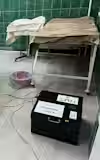Published
October 26, 2022
When Paul Shmotolokha, CEO and chairman of the board of New Use Energy Solutions and member of the U.S. Chamber Small Business Council, heard that Ukraine needed help, he didn’t hesitate. Earlier this year, he was about to go snowboarding when he got a phone call from a friend at an NGO—and the message was urgent. The war had just started and regular Ukrainians needed help, and fast.
“We just started mobilizing and said: ‘What can we do?’” Shmotolokha said. “We started cranking out projects with the nonprofits like FootPrint Project and smartAID.”
The first thing Shmotolokha and his team did was to help coordinate raising money and then to deliver $100,000 worth of battery-operated surgical headlamps from a Minneapolis-based small business, Enova Illumination, for field hospitals operating behind the front lines in Ukraine. The company also coordinated with Information Technology Disaster Resource Center (ITDRC) and smartAID to ship iPads to Ukrainian children who had been hospitalized in the conflict and offer WiFi access points for newly constructed refugee dormitories.
But that was just the start. The company quickly moved onto to doing what it does best: providing mobile electric power solutions in disaster areas or places with intermittent power—only this time it would be in a literal war zone.

Shipping to a War Zone
Shmotolokha, who happens to have years of prior business experience in Eastern Europe, and his team quickly swung into action. New Use Energy Solutions set up a program to ensure all equipment cleared Ukrainians customs quickly and that the lithium-ion batteries that power their systems could be safely shipped.
The next step was finding partners in the country who could receive and transport the solar power generators that the company makes to those who needed them.
“We aligned ourselves with an NGO in Ukraine that facilitates all the importation, distribution, warehousing and that has accountability,” Shmotolokha said. “We started producing solar generators and with our local partner, Tavido, adapted them to Ukrainian standards.”
In weeks, the company’s signature solar battery packs were being flown into the country and deployed. These mini-generators once connected to their accompanying portable solar panels, can run off of sunlight during the day and batteries at night. They can also plug into the grid, if it is available. These battery packs are designed to provide steady electricity during natural disasters like fires or hurricanes in places where the grid, or connections to it, have failed. Stateside, that usually means hospitals or community centers serving as ad hoc gathering points during a disaster response.
In Ukraine, they’re more likely to be put into use at mobile field hospitals or in hospitals, schools, or other vital infrastructure. These facilities, and the grid and power lines they connect to, can be under constant attack in a conflict zone where the front line is not always clear.
“They [the Russians] physically targeted the grid last week and they won’t stop. Thankfully, on the cyber side, Ukraine is very strong,” Shmotolokha said.
Powering Remote Hospitals and Saving Lives
At a hospital near Mykolaiv in Ukraine, the company’s power packs helped to restore power to operating rooms and other facilities when the hospital was hit by two Russian rockets, Shmotolokha said.
“They literally have to shut down the emergency room when they lose power,” Shmotolokha said. “Here you have an emergency room doctor who’s become a solar power specialist. He’s running all his principal equipment, ventilators and everything—because he has no other power.”

The head of the ICU at the hospital told Shmotolokha that the power generated by the company’s power packs allowed him to operate on at least two trauma patients (one had lost an arm, the other his leg) that he might not otherwise have been able to treat properly.
At other makeshift hospitals near the front lines and mobile hospitals units further from the front (similar to the MASH units of earlier conflicts) the company’s mobile power units are also in high demand.
“They’re running out of power daily or they’re getting it cut off. Because our stuff’s mobile, it moves very well to the frontlines,” Shmotolokha said. “This is in a shack in Kramatorsk near the front. These are make-shift. They throw the solar panels on the roof.”
Sometimes it’s a small business—with their deep local contacts, international savvy, and sheer nimbleness—that can become the most important player in times of crisis just like these, Shmotolokha says.
“You can make a difference. It’s a direct impact. I know we’ve saved lives,” Shmotolokha said. “A lot of small organizations can actually be more effective because they get in and do it directly and make a difference, so don’t discount them.”
About the author

Thaddeus Swanek
Thaddeus is a senior writer and editor with the U.S. Chamber of Commerce's strategic communications team.




